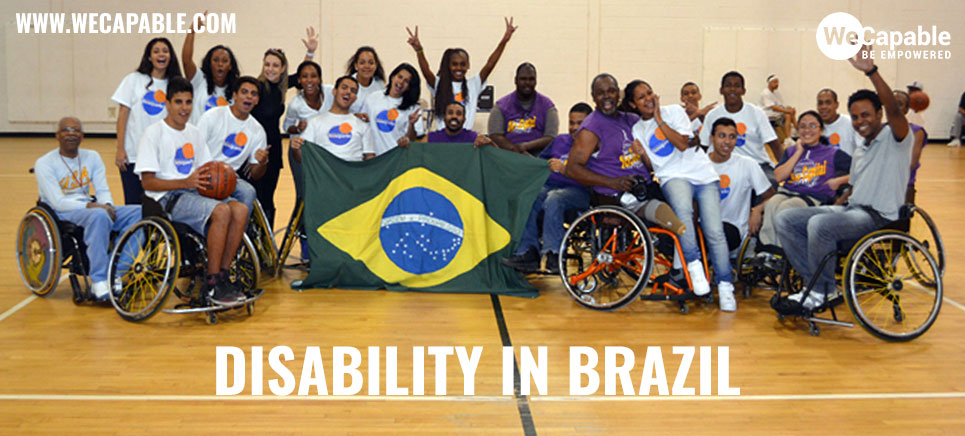Brazil is the largest country in both South America and Latin America. It is the sixth most populous country in the world. According to IBGE, Census 2010, about 16 million people or 8.3% of Brazil’s population have a severe form of disability. Also, 45.6 million people of 23.9% of the population have some level of disability in Brazil. In this article, let us see the status of disability and people with disabilities in Brazil.
Definition of Disability in Brazil
The term disability has been defined by the Brazilian Law on the Inclusion of Persons with Disabilities. The law recognizes a person as a disabled person if –
- the person suffers a long-term impairment
- the impairment is of physical, mental, intellectual or sensory nature
- when faced with one or more barrier, the impairment hinders full and effective participation in society on equal terms
Disability in Brazil is measured by the health indicators of daily activities and physical movements of a person.
Disability Legislation in Brazil
The Brazilian Law on the Inclusion of Persons with Disabilities (Statute of Persons with Disabilities) came into effect on 02 January 2016. This is the statute that aims at ensuring and promoting equality and inclusion as well as providing fundamental rights and freedom to persons with disabilities. The law is based on the Convention on the Rights of Persons with Disabilities and its optional protocol.
The legislation deals with various aspects that affect the lives of persons with disabilities. Following are the topics covered under the law –
- Equality and Non-Discrimination
- Rights to Priority Services
- Fundamental Rights – Right to Life
- Right to qualification and rehabilitation
- Right to health
- Right to education
- Right to housing
- Right to work (Professional rehabilitation and Inclusion of people with disabilities at work),
- Right to Social Assistance
- Right to Social Security
- Right to Culture, Sport, Tourism and Leisure
- Right to Transport and Mobility
- Accessibility
- Access to Information and Communication
- Access to Assistive Technology
- Right to Participate in Public and Political Life
- Right to Equal Recognition before Law

Rights of Employment in Brazil
The Brazilian law does not only provide the right to work to persons with disabilities but also mandates a quota for their employment. The reserved quota varies according to the size of the organization.
- Organizations with fewer than 100 employees need not create any reserved quota for persons with disabilities
- Organizations with 100 to 200 employees need to reserve 2% of the seat as a disabled quota
- If the organization employs up to 500 people it would need to create a 3% quota for the disabled people
- 4% reserved seats for persons with disabilities are mandated for organizations employing 500 to 1000 employees
- Organizations hiring over 1000 employees need to create 5% reserved seats for persons with disabilities
Further, the employer needs to provide on-the-job training to persons with disabilities who have the qualification but lack prior job experience. They are also obliged to offer reasonable accommodation for the employees with disabilities.
Employers are allowed (and expected) to collect the disability certificate of the employee if she is being used to fill the disability quota. No discrimination can be done with an employee with a disability. They need to be paid equally as their non-disabled co-workers.
Accessibility Requirements in Brazil
The Brazilian law mandates universal design not only for the physical environment, transportation etc. but also for information and communication systems and technologies. This means not only the physical premise but also the websites need to be accessible to persons with disabilities.
The law states that universal design must be taken as a general rule. In cases where adopting universal design is not possible, reasonable adaptations must be done.
Use the citation below to add this article to your bibliography
"Disability in Brazil: Population, Definition, Legislation, Accessibility and Employment." Wecapable.com. Web. April 26, 2024. <https://wecapable.com/disability-brazil-population-definition-legislation-accessibility-employment/>
Wecapable.com, "Disability in Brazil: Population, Definition, Legislation, Accessibility and Employment." Accessed April 26, 2024. https://wecapable.com/disability-brazil-population-definition-legislation-accessibility-employment/
"Disability in Brazil: Population, Definition, Legislation, Accessibility and Employment." (n.d.). Wecapable.com. Retrieved April 26, 2024 from https://wecapable.com/disability-brazil-population-definition-legislation-accessibility-employment/

Leave a Reply